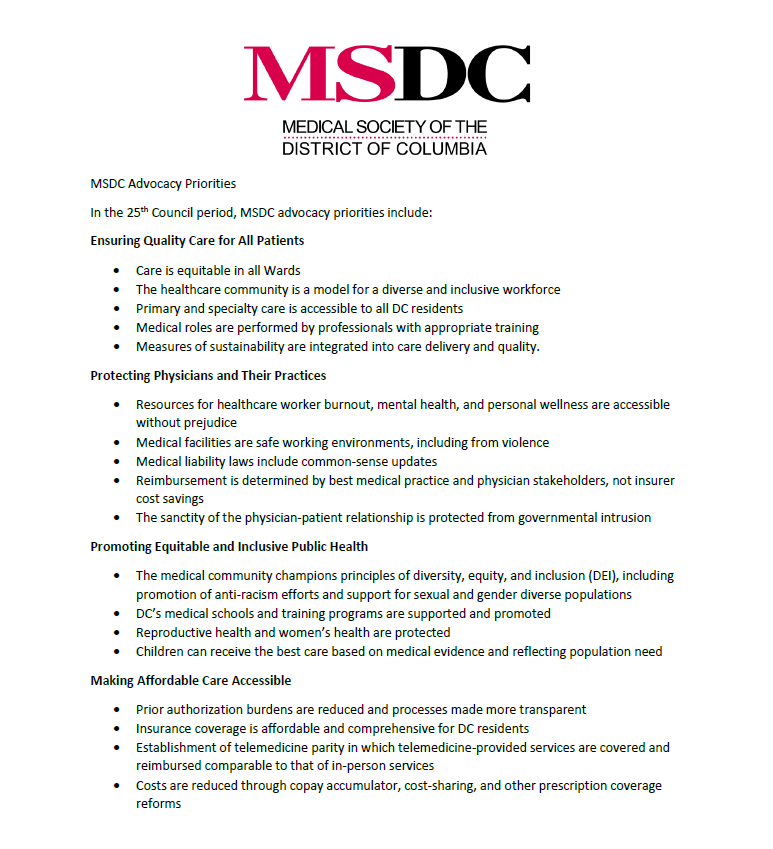Physician Voices for Patient Safety

On this page:
About the bill
Impact on patients in DC
Impact of physicians in DC
What can you do?
Resources
About the bill
In November 2023, DC Health introduced B25-545, the Health Occupations
Revisions General Amendment Act of 2023. This bill was a comprehensive
rewrite of the law overseeing medical licensing and regulation in
Washington, DC. Unfortunately, the bill as written overhauled
scope of practice, place allied health professionals in oversight
positions of medical licensing, and remove the physician from the center
of the care team. After much work and a number of legislative wins, the bill passed the Council on May 7.
MSDC has long advocated that a physician is the most qualified professional at the head of a care team. Physicians have the most health education and pre-practice experience of any health professional, and thus must be involved in all but the most mundane health care decisions. Allied health professionals are a valuable part of the care team, but their medical education and experience limits their role.
The Medical Society of the District of Columbia (MSDC) is the leading voice for physicians in Washington, DC, committed to uniting physicians to advocate for physician-led health care in Washington, DC that protects patients from harm and increases access to quality care. MSDC is leading a coalition of Washington, DC specialty medical societies to advocate against the Health Occupations Revisions General Amendment Act of 2023.
Impact on DC medicine
Below is a breakdown of some of the major changes the bill contains; click on the title to expand how the bill would change that item.
Currently the Board of Medicine is composed of 10 physicians and 4 members of the public. The bill as amended would reduce the number of physicians to 9 and adds 2 physician assistants but keep
the four members of the public health.
The concern: The bill would codify that APRNs could independently diagnose, prescribe, and administer medicine.
The details: See the analysis from G2L Law Firm on the APRN provisions | See our one-pager on this issue that you can share with colleagues and the Council
The solutions: Independent Advanced Certified Nurse Practitioners should have a defined scope of practice limited to the following functions:
- Practice only in the field of certification;
- Comprehensive physical assessment of patients;
- Certify to the clerk of the court that an adult has given birth;
- Certify to the Transportation authority that an individual has special needs for certain health reasons;
- Complete date of birth and medical information on a birth certificate;
- Complete a death certificate if medical examiner does not take charge and deceased was under the care of the PN;
- Establish medical diagnosis of common short-term and chronic stable health problems;
- File a replacement death certificate;
- Issue a “do not resuscitate order” in medical emergencies;
- Order, perform, and interpret laboratory and diagnostic tests;Prescribe drugs and devices under DC controlled substance Schedules II-V with a valid DEA license, and medical marijuana under DC laws;
- Provide emergency care within the scope of their skills;
- Refer patients to appropriate licensed physicians or other health care providers;
- Certify to utility company that a client has a serious illness or the need for life-support equipment;
- Witness an advanced directive;
- Sign off on home health/care orders.
The concern: As seen below, additional allied health professions are permitted to apply anesthesia. Most concerning is the scope expansion that could permit nurse anesthetists to practice without physician collaboration.
The details: See our one-pager on this issue that you can share with colleagues and the Council
The solution: This bill asks to repeal Section 603 of DC official code ₰3-1206.03, and this action will allow nurse anesthetists to administer anesthesia without an anesthesiologist or other physician's direct collaboration. Language seeking repeal of Section 603 of DC official code ₰3-1206.03 should not be included.
This bill adds Sec. 605a, which contains language that a CRNA may plan and deliver anesthesia, pain management, and related care to patients or clients of all health complexities across the lifespan. Language adding Sec. 605a should be removed from this bill.
The expands audiologists' scope to include "cerumen management" and "interoperative neurophysiologic monitoring" and permits audiologists to screen for cognitive, depression and vision.
The bill completely rewrites the definition of the practice of "chiropractic". Chiropractors could:
- Diagnose and treat biomechanical or physiological conditions that compromise neural integrity or organ system function
- Refer patients for further medical treatment or diagnostic testing
The details: See our one-pager on this issue that you can share with colleagues and the Council
The bill would expand pharmacists' scope to include:
- Ordering labs
- Scheduling and monitoring drug therapy
- Ordering, interpreting, and performing more tests
The details: See our one-pager on this issue that you can share with colleagues and the Council
The bill would permit physical therapists to independently evaluate and treat disability, injury, or disease. PTs may also order imaging as part of their treatment plan.
The concern: The bill expands podiatrists scope of practice to allow:
- apply anesthesia as part of treatment; and
- administer vaccines and injections.
The details: See our one-pager on this issue that you can share with colleagues and the Council
Throughout the bill, restrictions on nursing scope of practice are removed or loosened throughout. Specific language outlining what and how nurses can practice is removed and replaced with more vague language giving the Mayor (read DC Health)
the ability to dictate scope. This applies to many different nursing types, like APRNs and NPs.
Articles on scope of practice
MSDC Announces 25th Council Period Advocacy Agenda
With the current Council of DC legislative period approaching its end, MSDC is pleased to announce its advocacy agenda for the next two years.
At its December 5 Board of Directors meeting, the Board unanimously approved its advocacy priorities for 2023-2024. The agenda is modeled after the one the Board approved two years ago and establishes the Society's advocacy priorities during the next Council period. The agenda was updated and reviewed by MSDC's Advocacy Committee prior to the Board meeting.
As seen below, the agenda focuses on four areas that help make the District "the best place to practice medicine":
- Ensuring Quality Care for All Patients
- Protecting Physicians and Their Practices
- Promoting Equitable and Inclusive Public Health
- Making Affordable Care Accessible
Most of the priorities remain similar from the 2021-2022 document, as this one seeks to build off of a series of major advocacy wins this Council period. A summary of this session's advocacy successes will be published in the near future.
Making the list this year are a few new or
adjusted priorities. Nationwide challenges to the expertise of
physicians led to clearer calls for advocacy in areas like children's
healthcare, reproductive health, and health facility safety. The
document also includes for the first time advocacy for "measures of
sustainability" to reflect concerns about environment change and
medicine. Telemedicine is also explicitly spelled out as the pending end
of the federal public health emergency and insurer practice changes
endanger the effectiveness of this important medical tool.
MSDC
also looks to build on its unprecedented grassroots and testifying
record this Council period. MSDC members and physicians who want to become more involved in local advocacy can contact Robert Hay at hay [at] msdc.org.

